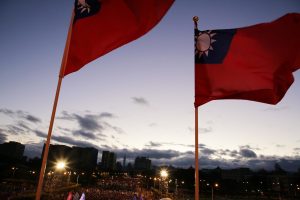The Taiwan problem in U.S.-China relations seems poised to grow, given China’s treatment of Hong Kong and the growing power of China’s military. Since the 1970s, the price of comity between the United States and the People’s Republic of China (PRC) has been a policy of ambiguity toward the Taipei regime (formally known as the Republic of China, or ROC). Now, with the military balance perceptibly shifting in China’s direction and with the idea of “one country, two systems” left in ruins by the Hong Kong crackdown, the problem doesn’t seem anywhere near a solution. Over the next few years, Taiwan would seem to offer the most dangerous flashpoint in the U.S.-China relationship.
The impasses naturally makes us think of roads not taken. Given the existing state of hostility between Beijing and Washington, would the United States really have lost anything if it had forcefully asserted its support for Taiwanese independence in the 1990s? The idea of imposing a fait accompli on Beijing and Taipei enjoyed little support at the time, but now deserves some reconsideration. While it is fashionable to suggest that China regards the Taiwan issue as non-negotiable, the act of declaring an issue to be non-negotiable is almost invariably a negotiating tactic. The United States accepted China’s framing of the PRC-ROC relationship during the late Cold War out of an interest in maintaining good relations with Beijing in order to hedge against the Soviet Union. In the 1990s, with the Soviet Union dead and the United States enjoying presumptive military superiority at China’s territorial limit, the United States had the opportunity to impose its own understanding of the relationship.
To be sure, the ramifications of this might well have been dramatic, with China severely curtailing investment, trade, and social contacts, as well as engaging in a degree of military adventurism. But the PRC would not have employed nuclear weapons in the face of certain destruction, would not have frittered away its navy and air force in a pointless display of suicidal gusto in the Taiwan Strait. Beijing could have continued to believe that Formosa was an integral part of its territory and behave as such, but the extent to which it would have been prepared to burn down its economic development program in a pointless effort to display disapproval is unclear. Indeed, a hardcore Chinese reaction would have undercut China’s economic growth, and consequently the foundations of China’s modern military power.
This is not to say that taking a hard line on China would have been popular within the United States, politically possible, or even a good idea. None of the George H. W. Bush, Bill Clinton, or George W. Bush administrations displayed much appetite for a serious confrontation with China, beyond the 1996 Taiwan Straits Crisis or the 2001 collision of an EP-3 spy plane off Hainan Island. Few analysts at the time argued that the U.S. should take advantage of Chinese weakness to impose Taiwanese independence, in part because of optimism about the long-range trajectory of Chinese governance. Leaders on both sides of the Pacific deeply valued the economic gains of the U.S.-China trade relationship, which helped to drive global economic growth during the 1990s and 2000s, even as they created and revealed structural problems with the global systems of trade and finance.
Meanwhile, Taiwan itself might not have been ready to pursue formal independence at the time. While Lee Teng-hui, who was elected president in Taiwan’s first democratic polls in 1996, later embraced full-on independence advocacy, at the time there was less public support. Many on the island still viewed themselves as possessing a joint Taiwanese and Chinese identity (49.3 percent, in a 1996 poll by National Chengchi University’s Election Study Center), or even as solely Chinese (17.6 percent). Just 24 percent saw themselves as Taiwanese alone. It’s only in the past decade that Taiwanese identity has surged. Today, the generation of people who fled from the mainland to Taiwan during the Chinese Civil War is dying out, but 25 years ago it was still going strong — and they might not have been keen to sever those ties with formal independence.
Had the Clinton administration pursued an aggressive strategy with respect to Taiwanese independence in the 1990s, we would today likely see an eerie echo of the debate over NATO enlargement, in which the decision to induct Eastern European members into the alliance is seen as having permanently poisoned the Washington-Moscow relationship. As it happens, China and the United States have coasted toward confrontation in any case, with Taiwan remaining dangerously unresolved and potentially unresolvable.

































